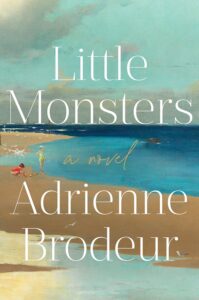Little Monsters delivers an elusive prize for those summering on the Cape: a book whose family drama is interwoven into the Cape’s microclimates, as inseparable from the landscape as mushrooms foraged in the National Seashore’s woods or the eroding sand of Stage Harbor.

Brodeur has come to the Cape all her life, staying in Orleans and visiting her father, the writer Paul Brodeur, in North Truro.
“I’ve always been taken with the natural beauty of the Cape,” she says. “I feel like, because my parents are divorced, and they were such different people, that I got to live these very different lives depending on where I was. With my father, I foraged and fished; with my mother, I got to know the more social aspects of Cape Cod.”
She’s drawn upon a lifetime of those experiences to create characters from all around the Cape’s flexed forearm: Adam, the patriarch, a marine biologist from Wellfleet; Abby, a painter living in her Truro dune shack studio; Ken, a real estate broker and political aspirant from Chatham; and Steph, a Boston cop who vacations in Provincetown with her wife each year.
Though this is just her second book, Brodeur’s literary experience runs deep: she is the former editor of the journal Zoetrope: All Story, which she founded with Francis Ford Coppola, and she now serves as executive director of Aspen Words, a program of the Aspen Institute that offers a yearly prize, residencies, and workshops.
Brodeur’s first book, Wild Thing, was a memoir, unearthing Brodeur’s memories of serving as her mother’s confidant and guardian of her double life during an extramarital affair. So, it comes as no surprise that Brodeur’s first novel is full of secrets.

In Little Monsters, the secrets vary in scale and scope — the promise to a spouse that you won’t talk about your relationship with the spouse’s sibling, who happens to be your best friend; cases of hidden paternity; denials of another’s childhood experience. Some are small and seemingly reasonable; but no matter their size, none is benign. Each has the power to transform by growing the family, welcoming others in, or closing someone off from potential love.
These secrets build a tension compounded by the book’s setting in the months before the election of 2016. “I didn’t want it to be a political book,” Brodeur says, “but I wanted to evoke some of the anxiety of that year when we all knew the ground was shifting, but we didn’t know how.”
The election is hardly mentioned in the book, but it looms in the background like a storm that is just about to break. As the male characters examine their own anxiety about how “hard it is to be a man,” the novel touches on something that is profoundly difficult to confront: why it is so hard for women to hold power.
One of the most compelling characters ends up being Ken, a man whose political ambitions and self-aggrandizement makes him all but unbearable at the novel’s start (he calls his desk “command central”). As he stomps through the emotional terrain of his family, insisting on the primacy of his perspective, it becomes evident that his flaws are the product of an immense childhood sadness that no one ever helped him to resolve. “Like any other animal, we’re most aggressive when we’re wounded,” Brodeur says, “and he’s a walking, gaping wound.”
The book’s most powerful scene comes when he breaks into his sister’s art studio and finally admits her perspective into his mind. In an almost out-of-body experience, he considers what childhood was like for her and the validity of how she experienced his most cherished memories.
Brodeur’s first novel delivers a living portrait of siblings at a time of great anxiety and division. Through their stories, the novel may just map our path forward and ask how we will proceed: will we come together or drive ourselves further apart?
